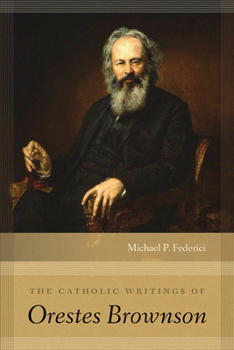The Catholic Writings of Orestes Brownson
This collection of thirteen original essays by Orestes Augustus Brownson (1803-1876), a major political and philosophical figure in the American Catholic intellectual tradition, presents his developed political theory in which he devotes central attention to connecting Catholicism to American politics. These writings, which date from 1856 to 1874, cover not only his conversion to Catholicism after experimenting with a variety of religious and political beliefs but also slavery, the Civil War, Reconstruction, the era of Jacksonian democracy, and a host of social, political, and economic issues. During this time, Brownson became one of the nation's leading thinkers and critics. Although faced with a dominant Protestant culture, Brownson argued for a political and social culture influenced by his deeply held Catholic faith. He defended Catholicism from the common charge that it was incompatible with American constitutionalism and, in fact, argued that it was the only spiritually viable foundation for American politics. He defended the political theory and institutions of the American framers, applauding their realistic view of human nature and the importance of both virtue in political leaders and checks and restraints in their constitutional structures. He opposed the rising influence of populist democracy by explaining its flawed assumptions about human nature and the possibilities of politics. Michael P. Federici's well-written introduction situates these essays within a coherent theme and explains how these essays are especially relevant to contemporary debates about populism, race, American exceptionalism, and the relationship between religion and politics. The book will interest students and scholars of American political thought, as well as those with an interest in religion and politics.
Related Subjects
Philosophy Political Science Politics & Social Sciences Religion Religion & Spirituality




